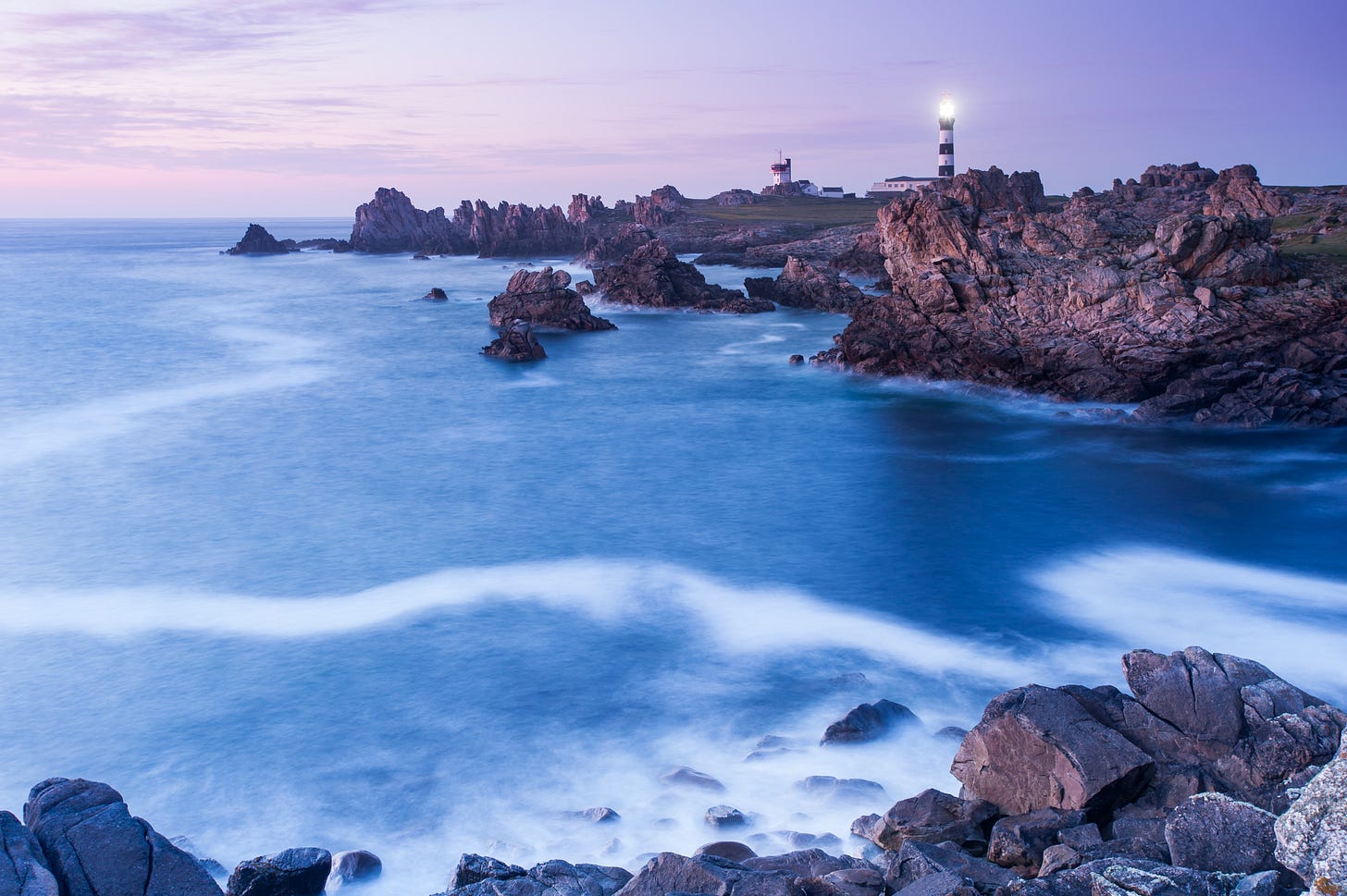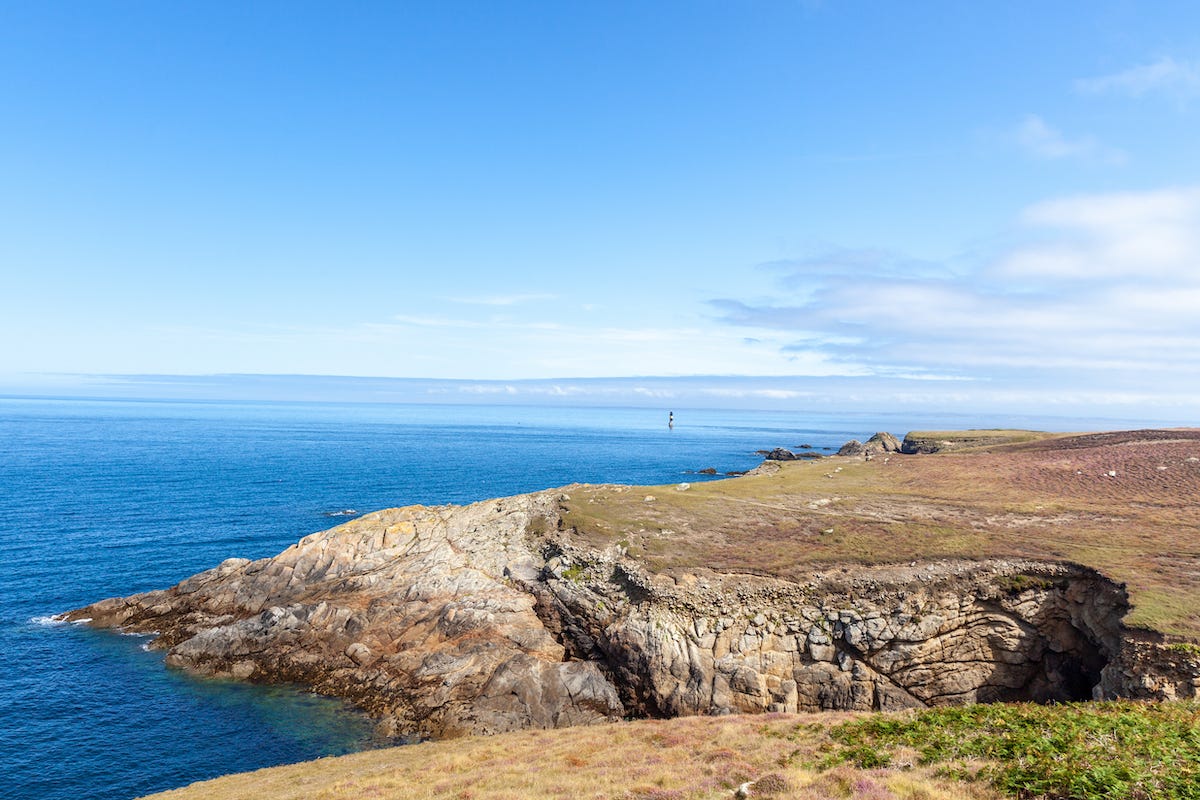Once Upon A Time In France: American Decay, Trappes Tension, And Sanofi Responds
Dreaming of Ouessant.
Against all better judgment, I am in the Paris region. I made the trip from Toulouse despite having written just last week about the misery that the winter months exact. As such, it seems the secret cabal of gremlins who control the weather have taken note and turned the region’s thermostat down to -4C. However, they have offered a small token of goodwill in the form of lingering snowfall that remains on the ground, like small traces of icing stuck on the plate after most of the cake has been eaten.
Getting used to northern climates will take some doing. That includes getting a warning from our daughter’s school that it would close early last week due to the impending “winter storm” and then remain shut the next day. Having lived in the Chicago area during the Blizzard of ‘79 and seen an overnight snowfall of 20.3 inches, I can recall not being able to open our front door for several days. Eventually, we had to crawl over the top of the drift and then dig a tunnel to create an exit to the street. School was canceled for almost 2 weeks as the region ground to a halt. It was a magical moment for a 10-year-old and has left me with a permanent sense of superiority whenever a pittance of snow sends other adopted hometowns, whether in North Carolina or Paris, into some limited paralysis.
Still, I accept the snowfall as a small gesture of kindness to an American at a time when our presence in France is causing a fair bit of consternation. France has its share of racial and economic issues, and it has been increasingly popular both culturally and politically to point the finger of blame at Americans for pointing these things out, particularly journalists who are accused of being incapable of understanding the nation’s values of universalism and laïcité. France does not officially recognize race, because everyone is just French.
New York Times reporter Norimitsu Onishi captured this scrap in a story last week that ran under the headline: “Will American Ideas Tear France Apart? Some of Its Leaders Think So.” Onishi wrote:
French politicians, high-profile intellectuals and journalists are warning that progressive American ideas — specifically on race, gender, post-colonialism — are undermining their society. “There’s a battle to wage against an intellectual matrix from American universities,’’ warned Mr. Macron’s education minister.
Emboldened by these comments, prominent intellectuals have banded together against what they regard as contamination by the out-of-control woke leftism of American campuses and its attendant cancel culture.
It’s a strange feeling as an American in France to see mainstream French politicians and academics making common cause with the far-right in the U.S. But here we are.
The Time’s story notes Macron’s own complaints about “certain social science theories entirely imported from the United States.” He made the remarks while laying out his proposals to combat Islamic “separatism” in France last fall. Following the beheading of a French teacher who had made comments about Islam in a class a few weeks later, Macron called the Times’ media columnist to complain about how the topic was being covered by “Anglo-American” journalists:
“Our model is universalist, not multiculturalist,” he said, outlining France’s longstanding insistence that its citizens not be categorized by identity. “In our society, I don’t care whether someone is Black, yellow or white, whether they are Catholic or Muslim, a person is first and foremost a citizen.”
Principals of universalism and laïcitë are admirable. But many activists have been arguing that France doesn’t always live up to them or apply them equitably. This is the point many tried to make when France saw its own massive Black Lives Matter demonstrations last summer. Whenever it’s noted that many of the people demanding France do more to recognize racism or religious discrimination are in fact French, it is often brushed off by insisting these people had been infected by American ideas in some fashion.
This has led to a broader critique of Americans’ influence on France and the resulting decaying of French values under this global spotlight. Which, of course, makes it awkward at times to be both an American and a journalist in France. One conservative French commentator last year, following a man being attacked with a baseball bat, proclaimed: “Nobody plays baseball in France. Can we completely ban the sale of baseball bats?”
I still feel welcome in France. The nation’s shared history run deep and there is a mutual affinity for each other that supersedes most of this political posturing. Yet when it comes to issues like these, it’s also a reminder to me how difficult it is to fully grasp the world view of someone from another culture, no matter how advanced one’s education or language skills.
Tension In Trappes
Speaking of France’s tense relationship with its Muslim population, the issue flared up again last week when Didier Lemaire, a professor of philosophy in the town of Trappes, said he was under police protection due to threats against his life.
The trouble? Lemaire said he had defended Republican values such as free speech and laïcité in the wake of the Samuel Paty beheading. Though, he remarks went just a tad farther.
“…we are not far from a scenario like an Algerian civil war…” he said, referencing a growing section of that Islamic community that had not embraced French values.
As Lemaire’s case gained national attention, he noted in one interview that Trappes, about an hour southwest of Paris, was “in the grip of radicalization.” This all put Trappes in the center of a national debate that often made it sound like the town had been overrun by jihadists.
This prompted the newly-elected mayor, Ali Rabeh, to defend the town and accuse Lemaire of spreading disinformation. When Rabeh tried to deliver a letter to students at Lemaire’s school, he was criticized by the national education minister for interfering for school matters.
Rabeh also now says he is under police protection following the dust-up. Making his position even more difficult: A commission just ruled that due to some campaign irregularities, it was annulling Rabeh’s election and ordering a new vote. Rabeh remains mayor for now.
It seems inescapable that, along with the economic fallout of the pandemic, issues surrounding France’s Muslim population are going to be front-and-center in the presidential elections that are just over one year away.
Sanofi Saga
Last week, I noted that the failure by the French pharmaceutical giant Sanofi to develop a Covid vaccine had made it the center of national handwriting as to whether France’s vaunted math and science skills were in decline. Since then, Olivier Bogillot, President of Sanofi France, has been delivering a series of ripostes to defend his company’s reputation.
Writing on LinkedIn, Bogillot said:
I see with amazement the escalation of untruths concerning our company. Some speak of "failure" in the vaccine race, while others do not hesitate to use the term "fiasco" to qualify Sanofi. Worse still, Sanofi is for some the main cause of an alleged loss of French leadership. How far will the trial of intent go when, at the same time, thousands of employees are working tirelessly to fulfill their essential mission: to preserve health, offer solutions to patients and reduce illnesses?
His point: Sanofi has been developing a vaccine using a more traditional approach that was slated to be ready towards the end of 2021. Nothing has really changed on that timeline. And with Sanofi working on 2 vaccine candidates and the world needing to vaccinate 7 billion people, there is still going to be a need for other vaccines as they come on the market.
“To speak of failure or fiasco is absurd and disrespectful for teams,” he said. “Beyond the Franco-French controversies, let us be proud to have a world health champion in France.”
Dreaming Of France: Ouessant
Brittany remains one of France’s most untamed and vast territories. We spent a lovely two weeks camping there in 2017, and we still only saw a couple of tiny corners. One of the striking things about the Brittany coast is that it conjures a sensation of standing on the edge of the world.
You can stay in Brest as a hub for discovering the region. But step away from the mainland to visit one of the islands off the coast and you’ll really feel like you’re standing on the precipice. One of the best islands to get this experience is Ouessant (or Ushant in the Breton language).
To get there, take a boat from either Brest (2.5 hours) or the seaside village of Le Conquet (45 minutes). Once on the island, either set out on foot or get some electric bikes and explore the small roads that traverse the moors and heather while passing through tiny hamlets. There are also several notable lighthouses, including the Créac’h and Le Stiff, the latter built in 1695 by France’s resident busybody architect Vauban.
The island has a cultural affinity with Scotland and even has its own official tartan. And later this year, a new 4-star hotel and spa will open on the island if you prefer pampering after exploring the wilds.
Great Reads
Amid a pandemic and the constant death tallies, tales of survival are always welcome. The Associated Press had this story of a French nun who celebrated her birthday in the most French of ways:
“Sister André also got a Mass in her honor and a feast with Champagne, red wine and port…baked Alaska, her favorite dessert…Her birthday feast included a starter of foie gras, followed by capon with fragrant mushrooms.”
I learned at my 50th birthday festivities that the French name for baked Alaska is omelette norvégienne, which is as delightfully nonsensical as baked Alaska. I’m still wondering what people in Norway call it.
Meanwhile, a 106-year-old French piano player has just released her 6th album. According to Reuters, Colette Maze has been playing since she was 4-years-old and has 4 pianos:
Maze credits yoga and finger gymnastics for keeping her nimble. If she stops playing she would need to feed her imagination somehow. “But I need something touchable. You need to taste candy, and my fingers need to feel the keys, to feel this,” as her feet reach for the pedals and she begins to play once more.
It’s a good thing some French are living forever because the pandemic seems to have put a dent in the birth rate. The lockdown last Spring did not trigger a national bonkfest, as some had predicted, that would lead to a Baby Boom. According to The Washington Post:
Nine months on, though, instead of a boom, France is witnessing a sharp decline in births. Economic uncertainty, social stress and in some cases anxieties about the virus itself appear to have prompted families to abandon or postpone plans to have a baby.
In other longevity news, a 17,000-year-old conch shell discovered 80 years ago in the Pyrénées has been identified as the world’s oldest wind instrument.
And finally, in more weird French crime, two brothers named STARSKY AND HUTCH!!! were arrested after fleeing a police stop. Starsky was arrested for drunk driving.
Chris O’Brien
Toulouse, France









